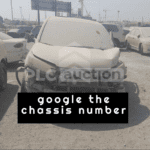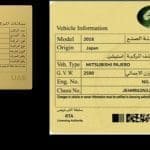

Rules and Regulations in UAE to Buy a Used Car
Title: Understanding the Rules and Regulations in UAE to Buy a Used Car
Keyword Focus: Rules to Buy Used Car
SEO Title: Rules and Regulations in UAE to Buy a Used Car
Slug: rules-regulations-uae-buy-used-car
Meta Description: Learn the key rules and regulations in the UAE when buying a used car. Discover how to ensure a safe and legal car purchase.
The United Arab Emirates (UAE) offers a dynamic used car market that attracts both locals and expats. Buying a used car in the UAE can be a convenient option for many, but it’s crucial to understand the rules and regulations involved. Whether you are looking for a family car, a luxury vehicle, or just a reliable mode of transport, following the proper guidelines ensures you make a secure and legal purchase.
Here, we break down the necessary steps, documents, and other regulations that you need to be aware of when buying a used car in the UAE. Whether you are in Abu Dhabi or any other emirate, knowing the rules to buy used cars can save you time, money, and potential headaches.
Legal Requirements for Buying a Used Car in the UAE
When you decide to buy a used car in the UAE, several legal requirements come into play. The regulations in the country are in place to protect both buyers and sellers. First, you must make sure that the car has no existing fines, violations, or issues that could cause problems in the future. This is a vital part of the process and must be checked before you proceed with the transaction.
A key part of the car buying process is the car inspection. The UAE mandates that all used cars undergo a thorough inspection before being sold. The inspection ensures that the car is roadworthy and meets safety standards. You should always request a detailed inspection report from the seller. This report will provide you with a breakdown of any potential issues the vehicle may have. You are also allowed to take the car to an independent inspection center of your choice.
In addition to the inspection, the car’s registration must be up to date. You need to check that the registration documents are current, and there should be no outstanding payments. Any outstanding fines, whether related to the vehicle or the driver, must also be cleared before purchasing the car. It is a legal requirement in the UAE to ensure that all fines are paid off.
The Importance of Verification Documents
Before buying a used car, you need to make sure all the required documents are in order. The following documents are essential when transferring ownership:
- Emirates ID: The buyer’s Emirates ID is required for the registration transfer.
- Vehicle Registration Card: This document includes essential details about the car, such as its make, model, and registration history.
- Insurance: In the UAE, car insurance is mandatory. Ensure the car you are purchasing is insured.
- Proof of Payment: The payment should be clearly documented, either by bank transfer or receipt.
- No Objection Certificate (NOC): If the car is financed, the seller must provide an NOC to prove that the loan has been settled.
These documents should be carefully reviewed before any agreement is made. Without them, the process cannot proceed legally, and you may face unnecessary complications.
The Car Transfer Process
Once the documentation is sorted out, the next step is the transfer of ownership. This process involves the seller and buyer visiting the Roads and Transport Authority (RTA) in Abu Dhabi or the relevant RTA office in other emirates. Both parties will need to submit their documents, and the RTA will carry out the transfer. The buyer will then receive the car’s new registration and ownership details. This step ensures that the car’s legal ownership is officially transferred to the buyer.
The transfer of ownership is a crucial step, as it legally validates your right to the vehicle. Make sure the car’s registration reflects your name and information to avoid future legal issues.
Payment Methods for Used Cars
In the UAE, cash, bank transfers, and financing are common payment methods for buying used cars. Bank transfers provide an added layer of security as they leave a digital trail of the transaction. It is important to ensure that the payment is handled professionally, and all agreements are documented. If you choose to finance your car purchase, make sure the terms are clear and that you understand the monthly payments and interest rates.
If you’re paying in cash, it is crucial to obtain a receipt and ensure that the car’s sale price is clearly documented. Avoid paying in installments unless you are comfortable with the terms of the arrangement.
Dealing with Dealers and Private Sellers
In the UAE, there are two common sources from which you can buy a used car: authorized dealers and private sellers. Authorized dealers are typically safer to deal with as they are licensed by the government. They usually offer warranties and some form of after-sales support. However, they tend to charge higher prices.
Private sellers can offer better deals, but there are risks involved. You should always be more cautious when buying from a private seller. Ensuring all paperwork is in order and the car passes an inspection will help protect your interests.
Fees and Taxes Involved
While the UAE is known for its tax-free system, when it comes to used cars, there are certain fees involved in the purchasing process. These include registration fees, insurance fees, and inspection fees. When registering the car at the RTA, you will also need to pay a small fee for the transfer of ownership. These costs vary depending on the vehicle’s make, model, and the emirate you are in.
Make sure to ask for an estimated breakdown of all fees before finalizing the transaction.
The Role of Online Platforms in Buying Used Cars
In the digital age, many buyers prefer to use online platforms to search for used cars. Websites like iCarsU.com have made the process easier by listing available vehicles, along with their prices and details. Online platforms also provide valuable information about the vehicle’s history and inspection reports, helping you make an informed decision.
Moreover, buying through these platforms gives you the added security of dealing with a trusted intermediary, which can reduce the risks associated with purchasing from private sellers.
What to Do if You Encounter Problems After Buying the Car
In case you encounter problems with the car after the purchase, the first step is to contact the seller. If you bought the car through an authorized dealer, they may provide some assistance, depending on the warranty terms. If you purchased the car privately, however, you might face difficulties if there are issues that weren’t disclosed.
It’s important to be aware of your rights as a consumer. In the UAE, consumer protection laws ensure that any undisclosed defects or problems with the car can be contested. If the issue is serious, you may be entitled to a refund or a replacement. Always document any issues you encounter and take the matter up with the seller as soon as possible.
Final Thoughts
Buying a used car in the UAE can be a smooth and rewarding experience if you follow the necessary rules and regulations. From ensuring that all documentation is in order to understanding the car inspection process, staying informed will help you avoid unnecessary complications. Additionally, purchasing from authorized dealers and using reliable platforms like iCarsU.com can provide an added layer of security.
Before finalizing the deal, make sure to verify that all fees are clear, and the transfer of ownership is properly processed. By adhering to these guidelines, you can confidently make your purchase and enjoy your new vehicle without worrying about legal or financial troubles.
What are the key rules to buy a used car in Abu Dhabi?
The key rules to buy a used car in Abu Dhabi include ensuring the car undergoes a proper inspection, checking that all registration documents are up-to-date, and verifying that there are no outstanding fines or legal issues with the car. It’s also important to confirm that the car has valid insurance and that all payments are properly documented.
Can I buy a used car from a private seller in Abu Dhabi?
Yes, you can buy a used car from a private seller in Abu Dhabi, but you should take extra precautions. It’s important to verify the vehicle’s history, inspect it for any issues, and ensure that the transfer of ownership is handled correctly with the Roads and Transport Authority (RTA). Always check the car’s registration, fines, and ensure that all paperwork is in order.
How do I check if a used car has outstanding fines in Abu Dhabi?
To check if a used car has any outstanding fines in Abu Dhabi, you can visit the RTA website or app and enter the car’s registration details. This service allows you to verify if the vehicle has any pending fines before finalizing the purchase. It’s crucial to ensure that all fines are cleared, as you won’t be able to transfer ownership until they are paid.
What documents do I need to buy a used car in Abu Dhabi?
To buy a used car in Abu Dhabi, you will need the buyer’s Emirates ID, the vehicle’s registration card, proof of insurance, the No Objection Certificate (NOC) if applicable, and proof of payment. These documents are necessary to complete the transaction and transfer ownership legally.
Can I sell my car near me in Abu Dhabi through an online platform?
Yes, you can sell your car near you in Abu Dhabi using online platforms like iCarsU.com. These platforms simplify the selling process by helping you list your car, connect with potential buyers, and ensure the proper legal procedures for selling a car are followed. Always make sure to verify the buyer’s credentials and follow the rules for transferring ownership.
Sell any car cash todayCheck our Blog posts for more tips related to buying, selling, or registering a used car in Abu Dhabi, dubai or any place in UAE.
Add a comment Cancel reply
Categories
- Abu Dhabi (2)
- Accidents (3)
- Car Registration (1)
- GCC Specs (3)
- Imported (3)
- Sell a car (1)
- Specs (1)
- Uncategorized (11,164)
Recent Posts
Related posts


Sell My Car in Al Hisn Easily and Safely
Sell Any Car in Al Hisn Easily and Fast












